Megalneusaurus
Megalneusaurus is an extinct genus of large pliosaur that lived in the Sundance Sea during the Kimmeridgian, ~156-152 million years ago, in the Late Jurassic. It was named by paleontologist W. C. Knight in 1895.
| Megalneusaurus Temporal range: Late Jurassic | |
|---|---|
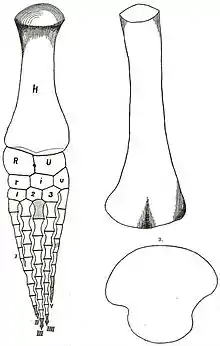 | |
| Illustration of some of the holotype fossils. | |
| Scientific classification | |
| Domain: | Eukaryota |
| Kingdom: | Animalia |
| Phylum: | Chordata |
| Class: | Reptilia |
| Superorder: | †Sauropterygia |
| Order: | †Plesiosauria |
| Family: | †Pliosauridae |
| Clade: | †Thalassophonea |
| Genus: | †Megalneusaurus W. C. Knight, 1898 |
| Type species | |
| Megalneusaurus rex W. C. Knight, 1898 | |
The genus and type species were based upon ribs, vertebrae, a fore-paddle and fragments of the pectoral girdle discovered in the Sundance Formation in Wyoming, USA in 1895.[1] The species named Megalneusaurus rex (meaning "great swimming lizard king") in 1898.[2] However some of this material has since been lost, although new material has been discovered from the same site.[3] Based upon the bones very large size, it appears to have grown to a size comparable to Liopleurodon.
Material from southern Alaska has been referred to as Megalneusaurus, although this material is from an individual of much smaller size, twice lesser than M. rex.[4]
Description
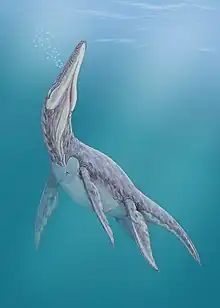
Megalneusaurus is said to reach lengths of 7.6 to 9.2 m (25 to 30 ft),[5][6] though there are some estimates that propose a length of 11 m (36 ft).
Habitat
Megalneusaurus hunted in the warm waters of the Sundance Sea around 155 million years ago. The large, inland sea hosted a wide array of marine reptiles,[7] including the ichthyosaur Baptanodon,[8] and the cryptoclidid plesiosaurs Pantosaurus and Tatenectes.[9]
References
- Knight WC. 1895 A new Jurassic plesiosaur from Wyoming. Science 2: 449.
- Knight WC. 1898. Some new Jurassic vertebrates from Wyoming. American Journal of Science 4: 378-381.
- Wahl WR, Ross M, Massare JA. 2007. Rediscovery of Wilbur Knight’s Megalneusaurus rex site: new material from an old pit. Paludicola 6 (2): 94-104.
- Weems RE, Blodgett RB. 1996. The pliosaurid Megalneusaurus: a newly recognized occurrence in the Upper Jurassic Neknek Formation of the Alaska Peninsula. U.S. Geological Survey Bulletin 2152: 169-175.
- "The Largest Pliosaurid from North America". Archived from the original on 1 August 2016.
- Judy Massare, William R Wahl, Melissa Connely, Mike Ross (2014). Palaeoecology of the marine reptiles of the Redwater Shale Member of the Sundance Formation (Jurassic) of central Wyoming, USA. Geological Magazine 151(01):167-182 DOI:10.1017/S0016756813000472
- "Mesozoic Stratigraphy in the Thermopolis Area". Big Horn Basin Foundation. Retrieved 2007-02-06
- Ilaria Paparella; Erin E. Maxwell; Angelo Cipriani; Scilla Roncacè; Michael W. Caldwell (2017). "The first ophthalmosaurid ichthyosaur from the Upper Jurassic of the Umbrian–Marchean Apennines (Marche, Central Italy)". Geological Magazine. 154 (4): 837–858. doi:10.1017/S0016756816000455.
- O'Keefe FR, and Wahl W. (2003). "Current taxonomic status of the plesiosaur Pantosaurus striatus from the Upper Jurassic Sundance Formation, Wyoming". Paludicola. 4 (2): 37–46.
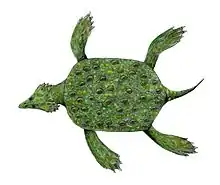
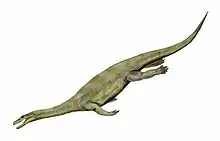


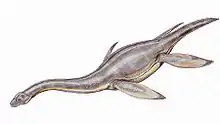
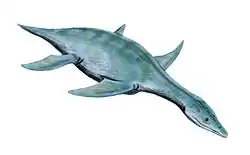
.png.webp)